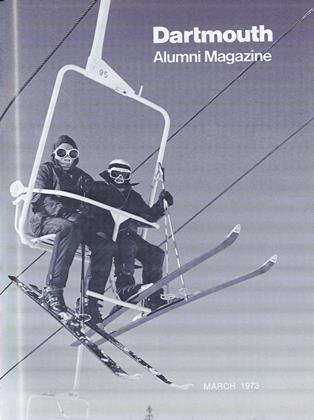A statement in the October Undergraduate Chair has been variously misinterpreted, which leads me to examine the chasm separating alumni and student opinion, an abyss that seems to yawn ever wider.
That statement of October read: "The ranks of student supporters (Autumn Activists) swell with students who wish to do something more constructive than a lineby-line translation of Paradise Lost."
This was not an error meant to infer, as one alumnus suggested, that Milton wrote Paradise Lost in a foreign language. (Would I dare ever look Profs. Thomas Vargish and Jeffrey Hart in the eye again?)
Rather the statement was intended to underscore the current re-evaluation of strict academia as to its place in undergraduate education.
To the extent that the evidently weak witticism failed, an apology is due all readers. Beyond that, since the statement capsulated the entire column, I am left wondering about the attitude of alumni towards the Chair and undergraduate opinion in general.
On campus, one sees many undergraduates gleefully reach for the, Alumni Magazine just to read "Letters to the Editor" and laugh at what the "old fools" have written.
Suddenly, I find myself wondering if perhaps this writer is a "young fool" to most alumni readers.
As one who has seen ROTC disband, voted for coeducation, and backed the Native Americans in their effort to eliminate the Dartmouth Indian, I cringe every time I review the replies from irate alumni.
Doubtless, many readers have felt the same impatience with this and every naive undergraduate who has little experience and no sense of the larger perspective of life needed beyond college.
To each alumnus, I can only reply that, in truth, present students love Dartmouth no less than he does. But this love is for a College willing to recognize, indeed anticipate, the needs of a changing society - and then respond with a will and heart.
So, what sort of change constitutes improvement? How is that change then effected?
These questions will never be resolved in single-sided columns like The Undergraduate Chair and may never be resolved at all. However, one cannot even approach the problems, or plans for Dartmouth's future, without an adequate forum to express opinion.
How do the old fools and young fools get a chance to exchange ideas?
Even in disagreeing these groups will gain a better appreciation of each other, which is far better than sputtering from opposite ends of printed pages. These two important segments of the Dartmouth Community lack a place, time, and perhaps inclination to meet and discuss issues of current interest.
Alumni may hear a few "representative" students at functions or reunions, but that is probably even less effective than student discussions with the occasional alumnus who returns to his fraternity on a football weekend. The free exchange of opinions in a serious context simply does not occur.
And without that free exchange of ideas does the fabled Dartmouth Community even exist? Can a community thrive without communication between its members?
Certainly, the best means to communication lies in personal contact. Letters-to-the-editor, magazine columns, and essays are at best a poor substitute for individual consultation. If more alumni and students met together, the understanding
of each group's sincerity and concern would doubtless grow through face-to-face contact. Perhaps a type of Dartmouth Issues Forum could be established to initiate meetings like this; such sessions might also lead to greater understanding of social questions in general, rather than just Dartmouth concerns. And that could only improve relations in a society where youth seeks to change basic institutions and adults seem to feel that change weakens the country, morally, materially and spiritually.
Since no one has the time, however, and the returns are intangible, student-alumni forums will probably not develop. Instead, perhaps a newsletter, devoted just to the exchange of student-alumni opinion could be formed. Printed word or no, something must be done.
An encouraging note comes from the Dartmouth Clubs of Boston and Paris which met last fall at the College's Foreign Language Center in Bourges, France. Students, alumni, and faculty met on the same ground and discussed College policy with only light casualties reported. Romance Languages Professor John Rassias said that the affair was a valuable, rewarding experience for all.
Meanwhile alumni opinion circles among alumni, student opinion circles among students, and each group takes thedevil-with-them attitude towards the other. Only exaggeration and over-simplification filters into each whirlpool, spinning it faster and increasing the turbulence all the while.
Also, the administrators at Crosby Hall in charge of alumni relations have organized orientation dinners with seniors to ask what they expect from and for Dartmouth after graduation. Encouraging signs, but still the exception.
As with muffled laughter at a standing joke, one can hear each group cursing and chuckling at the other's opinions found in "underground" copies of The Dartmouth and Alumni Magazine.
Hopefully, these two standing jokes will find some time some place to sit down and chat.
Quarterback Steve Stetson '73 receivingthe Bob Blackmail Trophy as the outstanding player on Dartmouth's 1972 IvyLeague champion football team, at thefootball banquet in Alumni Hall.
 View Full Issue
View Full Issue
More From This Issue
-
 Feature
FeatureSailing Dreams and Random Thoughts
March 1973 By JAMES H. OLSTAD '70 -
 Feature
FeatureNotes Towards a "Whole Life Catalog"
March 1973 By ALAN T. GAYLORD, DIRECTOR -
 Feature
FeatureTHE ACRONYM SYNDROME
March 1973 By JAMES L. FARLEY '42 -
 Feature
FeatureFACULTY WOMEN
March 1973 -
 Feature
FeatureUNDERGRADUATE JOURNAL
March 1973 -
 Article
ArticleBrautigan's Search for Reality
March 1973 By RICHARD D. CARYOLTH '73
BRUCE KIMBALL '73
-
 Article
ArticleThe Undergraduate Chair
MAY 1972 By BRUCE KIMBALL '73 -
 Article
ArticleThe Undergraduate Chair
JUNE 1972 By BRUCE KIMBALL '73 -
 Article
ArticleThe Undergraduate Chair
NOVEMBER 1972 By BRUCE KIMBALL '73 -
 Article
ArticleThe Undergraduate Chair
DECEMBER 1972 By BRUCE KIMBALL '73 -
 Article
ArticleThe Undergraduate Chair
JANUARY 1973 By BRUCE KIMBALL '73 -
 Article
ArticleThe Undergraduate Chair
FEBRUARY 1973 By BRUCE KIMBALL '73







